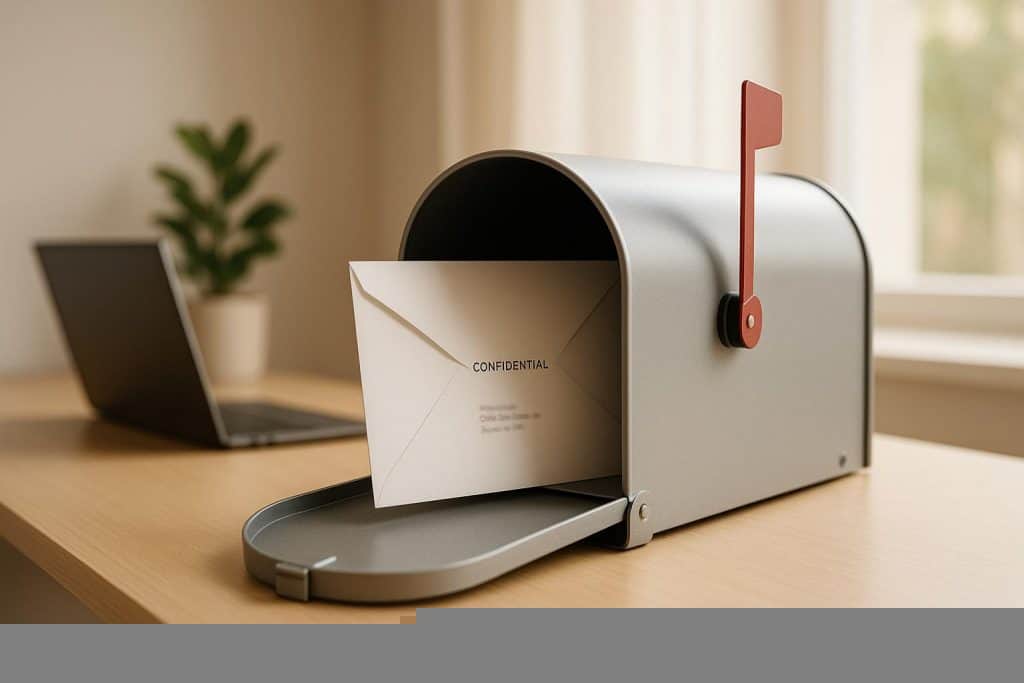Want to protect your privacy while running a business? A virtual address is the answer.
A virtual address is a real, physical business address that keeps your home address private. It securely handles your mail, meets legal requirements, and ensures your personal details stay off public records. Here’s why it’s useful:
- Privacy: Keeps personal and business addresses separate.
- Security: Digitally scans and stores your mail safely.
- Compliance: Meets state laws for business registration.
Key Features to Look For:
- Encryption and two-factor authentication for security.
- Tiered pricing plans starting at $20/month.
- Mail handling options like scanning, forwarding, and storage.
A virtual address is ideal for freelancers, digital nomads, and entrepreneurs who want a professional image without risking personal privacy.
Privacy Benefits of Virtual Addresses
Keeping Personal and Business Addresses Separate
A virtual address helps you keep your personal and business lives distinct. If you use your home address for business registration, it becomes part of public records, which can lead to privacy and legal concerns. A virtual address offers a dedicated business location, keeping your home address private. This is especially useful for home-based business owners, digital nomads, and freelancers. It also plays a key role in managing mail more effectively.
Secure Handling of Mail and Documents
Virtual address services come with digital tools to manage your mail securely. Incoming mail is scanned and stored digitally, accessible through an online dashboard. This reduces the chances of theft or unauthorized access. For example, providers like Business Anywhere combine these features into an easy-to-use platform. Secure mail handling also ensures compliance with state laws regarding privacy and business registration.
Complying with Privacy Laws
In the U.S., businesses must have a registered address in the state where they operate. Virtual address services meet this requirement while safeguarding your privacy. They also simplify the process of receiving legal notices and compliance updates. By using a virtual address, you can maintain a professional image, meet legal requirements, and protect your personal security all at once.
Selecting a Virtual Address Provider
Security Features to Look For
When choosing a virtual address provider, prioritize strong security measures. Look for encryption to safeguard communications and document storage. Features like two-factor authentication are crucial for protecting account access, and secure protocols should prevent any mishandling of your physical mail.
Key security elements to consider include:
- Document encryption to protect sensitive information
- User authentication to verify access
- Physical mail security to prevent tampering
- Access controls for managing multiple users
- Automated compliance alerts to stay updated on regulations
Price and Service Comparison
Virtual address providers vary in pricing and features, so it’s important to find one that fits your needs without overspending. For example, Business Anywhere offers tiered pricing options, starting with a Basic plan at $20 per month, a Premium plan at $30 per month, and an Advanced plan at $65 per month for up to 20 mail recipients.
When comparing services, focus on these essential categories:
| Feature Category | Basic Needs | Advanced Requirements |
|---|---|---|
| Mail Handling | Scanning, Storage | Forwarding, Package Reception |
| Digital Tools | Online Dashboard | Mobile App Access |
| Security | Basic Encryption | Advanced Authentication |
| Support | Email Support | 24/7 Customer Service |
This breakdown can help you identify which provider aligns with your specific needs.
Provider Quality Check
Once you’ve narrowed down your options based on features and pricing, take a closer look at the provider’s reputation and reliability. Check their track record and the quality of their customer support. A dependable provider should offer:
- An intuitive dashboard for managing all services
- Alerts and reminders to help with compliance
- Transparent pricing without hidden fees
- Responsive customer support for quick issue resolution
To ensure the service meets your expectations, test free dashboard demos whenever possible. This will give you a hands-on feel for the platform’s functionality and ease of use.
sbb-itb-ba0a4be
Setting Up Virtual Address Privacy
Getting Started Guide
To verify your virtual address, make sure you have these documents ready:
- Government-issued ID: A valid driver’s license, passport, or state ID.
- USPS Form 1583: A notarized form authorizing mail receipt.
- Business documentation: An EIN certificate or business license (if setting up a company address).
- Proof of physical address: A recent utility bill or lease agreement.
Verification usually takes 1–2 business days. Business Anywhere simplifies this process with an integrated dashboard that walks you through each step. It even offers remote online notary services to authenticate Form 1583. Once verified, you can use their tools to manage your mail with ease.
Mail Management Steps
Here’s how to effectively manage your mail:
- View mail instantly with high-resolution scans.
- Organize correspondence by sender, date, or priority.
- Download digital copies to keep permanent records.
- Request physical forwarding when you need the original documents.
You can fine-tune these settings in the dashboard:
| Setting | Purpose | Configuration |
|---|---|---|
| Scan Quality | Ensures document clarity | High-resolution (300 DPI) |
| Storage Duration | Keeps records accessible | Unlimited cloud storage |
| Notification Preferences | Alerts for new mail | Immediate email alerts |
| Forward Rules | Automates processing | Sender-based routing |
Privacy Maintenance Checklist
Keep your virtual address secure by regularly reviewing these areas:
1. Access Control Review
Check who has access to your account. Update passwords and enable two-factor authentication for added security.
2. Mail Handling Protocol Update
Revisit your mail sorting rules and forwarding preferences. Make sure sensitive documents are flagged correctly.
3. Compliance Verification
Ensure your virtual address setup complies with current privacy laws and meets your business needs.
4. Security Settings Audit
- Confirm encryption for stored documents.
- Test notifications for unauthorized access attempts.
- Check audit logs for unusual activity.
- Update emergency contact details as needed.
Summary
Using a virtual address is a smart way to protect sensitive information while maintaining a professional image. It helps keep personal and business addresses separate, enhances mail security, and ensures compliance with legal requirements.
Here’s a quick breakdown of key elements to consider:
| Privacy Component | Benefit | How to Implement |
|---|---|---|
| Address Separation | Shields personal information | Use a business-specific address |
| Mail Security | Keeps mail safe | Opt for digital scanning and secure storage |
| Compliance | Aligns with legal standards | Helps meet privacy regulations |
Business Anywhere simplifies managing virtual addresses by offering a centralized platform. Their system handles mail scanning, document storage, and more – all in one place. With unlimited scanning and storage, plus services like company formation, registered agent support, virtual mailboxes, and online notary tools, Business Anywhere empowers entrepreneurs to securely manage their operations from any location.
FAQs
How does a virtual address protect the privacy of my business mail?
A virtual address helps safeguard your business mail by keeping your personal address private. Instead of using your home or office address, your mail is sent to a secure, professional location, reducing the risk of identity theft or unwanted visitors.
Additionally, virtual addresses often include features like secure mail handling and digital scanning, ensuring your sensitive information is managed safely and conveniently. This is especially beneficial for entrepreneurs and small business owners who work remotely or do not have a physical office.
What should I look for when choosing a virtual address provider?
When selecting a virtual address provider, it’s important to consider a few key factors to ensure the service meets your needs. First, check the privacy and security measures in place to protect your personal information. A reputable provider should keep your data confidential and offer secure mail handling.
Next, evaluate the features and flexibility of the service. Look for options like mail forwarding, scanning, and notifications to manage your mail efficiently. It’s also helpful if the provider offers additional services, such as registered agent support or business registration, to streamline your operations.
Finally, consider the location and credibility of the address. A professional address in a well-known area can enhance your business image, while a reliable provider will ensure consistent service. Taking the time to assess these factors will help you choose a virtual address provider that aligns with your goals.
How can using a virtual address protect my privacy and help with legal compliance?
Using a virtual address offers significant privacy benefits by keeping your personal address confidential. Instead of listing your home or office address on public records, a virtual address serves as a professional substitute, which can help prevent unsolicited mail and protect your personal information from being exposed. This is particularly useful for entrepreneurs, freelancers, and small business owners who operate from home.
Additionally, virtual addresses can help your business comply with certain legal requirements. For instance, many states require a business to have a physical address for registration or official correspondence. A virtual address fulfills this requirement while maintaining your privacy. This makes it a practical solution for businesses aiming to meet legal standards without compromising personal security.








